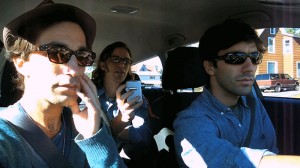Documentary-style film offers an Internet thriller
Many critics have hailed Catfish, the reality thriller from Henry Joost and Ariel Schulman, as a product of our time — a Hitchcockian tale that couldn’t exist without the Internet, social networks or the ability to dump digital videos onto hard drives until space runs out. Although that’s true, our time might be what eventually undoes Catfish as well.
As a clarification, the film has nothing to do with fish. At least not in the literal sense.

Candid camera · The film creates a story comprised of documentary-style footage, in the vein of films such as The Fourth Kind and Paranormal Activity, with likeable characters and a romantic storyline. - Photos courtesy of Rogue
In 2007, photographer Nev Schulman — co-director Ariel Schulman’s brother — received a painting of one of his pictures from an 8-year-old named Abby. Over the next few months, they become e-pen pals. He sent pictures and she sent her art which for an 8-year-old’s work is stunning. Through Facebook, he connects with her parents, brother and older sister Megan. Then, things get interesting.
The relationship that develops between Megan and Nev is decidedly more adult. They speak for hours at a time over the phone and also exchange art. Megan paints pictures of Nev, which she says she rests on her chest while sleeping; Nev Photoshops Megan into a picture of himself naked from the waist up. They do lots of sexting. They’re in love.
Then one night while on a filmmaking trip to Vail, Colo., Joost and the Schulmans catch Megan in a lie. They travel to Michigan to meet her and discover —
Going on would spoil the movie.
The genius in Catfish lies in the psychological depths that the third act explores and even more so, how cleverly that third act unfolds. Schulman and Joost play on the expectations the audience brings to the theater — preconceived notions of the perils of online dating and what happens in the dark during reality thrillers filmed on grainy hand-held cameras. Even as Mark Mothersbaugh’s plucky score bounces along, audience members sits perched on the edge of their seat.
Hitchcock would be proud.
But those audience expectations could be Catfish’s biggest obstacle. Walking out of the theater, the debate centers on one thing: Is it real?
The Blair Witch Project, Paranormal Activity and The Fourth Kind share the blame. They were all documentary-style horrors that purported themselves to be true. In the end, they weren’t, and the audience will suspect the same of Catfish.
If it’s a hoax, then Joost and the Schulmans are master magicians. They’re careful to show typos as Nev chats with Megan, or technical glitches, like when Ariel accidentally takes a still photo with his video camera during a crucial scene. More impressive, they balance the inherent humor of three guys working together and make the film as funny and lighthearted as it is suspenseful.
If it’s a hoax, Nev Schulman deserves an Oscar for bringing an endearing, honest character to life so successfully that it’s difficult to detect an ounce of affectation. He’s the perfect romantic hero for the film: handsome, good-natured and silly. In one scene, Nev forgets the camera’s presence and talks with his hand shoved down the front of his pants. In another, he wears his retainer while reading aloud a sexually explicit exchange of text messages before covering his head with his blanket, his voice cracking with embarrassment.
If it’s a hoax, these guys are better than anyone who’s come before them.
But if it’s not, then the three have managed to capture a moment between two people that starts fun and romantic and unexpectedly becomes sad and startling. Though its methodology is undeniably a product of our times, the mystery of Catfish and the revelation at the end is a timeless one.
The ultimate lesson of Catfish is that people occasionally come along and keep us on our toes. They make life more interesting, and make us better people for it. Wrapped into that is the grade-school lesson of “Don’t judge a book by it’s cover.”
To fully appreciate Catfish, don’t judge it by its predecessors. True or false, it’s a moving story and fantastically told.
